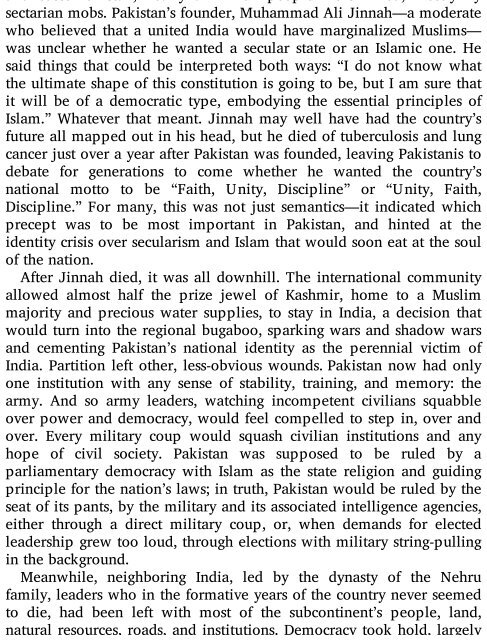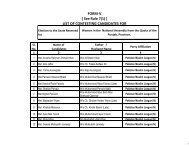the_taliban_shuffle_-_kim_barker
the_taliban_shuffle_-_kim_barker
the_taliban_shuffle_-_kim_barker
You also want an ePaper? Increase the reach of your titles
YUMPU automatically turns print PDFs into web optimized ePapers that Google loves.
and West Pakistan, nearly a million people were killed, mostly by<br />
sectarian mobs. Pakistan’s founder, Muhammad Ali Jinnah—a moderate<br />
who believed that a united India would have marginalized Muslims—<br />
was unclear whe<strong>the</strong>r he wanted a secular state or an Islamic one. He<br />
said things that could be interpreted both ways: “I do not know what<br />
<strong>the</strong> ultimate shape of this constitution is going to be, but I am sure that<br />
it will be of a democratic type, embodying <strong>the</strong> essential principles of<br />
Islam.” Whatever that meant. Jinnah may well have had <strong>the</strong> country’s<br />
future all mapped out in his head, but he died of tuberculosis and lung<br />
cancer just over a year after Pakistan was founded, leaving Pakistanis to<br />
debate for generations to come whe<strong>the</strong>r he wanted <strong>the</strong> country’s<br />
national motto to be “Faith, Unity, Discipline” or “Unity, Faith,<br />
Discipline.” For many, this was not just semantics—it indicated which<br />
precept was to be most important in Pakistan, and hinted at <strong>the</strong><br />
identity crisis over secularism and Islam that would soon eat at <strong>the</strong> soul<br />
of <strong>the</strong> nation.<br />
After Jinnah died, it was all downhill. The international community<br />
allowed almost half <strong>the</strong> prize jewel of Kashmir, home to a Muslim<br />
majority and precious water supplies, to stay in India, a decision that<br />
would turn into <strong>the</strong> regional bugaboo, sparking wars and shadow wars<br />
and cementing Pakistan’s national identity as <strong>the</strong> perennial victim of<br />
India. Partition left o<strong>the</strong>r, less-obvious wounds. Pakistan now had only<br />
one institution with any sense of stability, training, and memory: <strong>the</strong><br />
army. And so army leaders, watching incompetent civilians squabble<br />
over power and democracy, would feel compelled to step in, over and<br />
over. Every military coup would squash civilian institutions and any<br />
hope of civil society. Pakistan was supposed to be ruled by a<br />
parliamentary democracy with Islam as <strong>the</strong> state religion and guiding<br />
principle for <strong>the</strong> nation’s laws; in truth, Pakistan would be ruled by <strong>the</strong><br />
seat of its pants, by <strong>the</strong> military and its associated intelligence agencies,<br />
ei<strong>the</strong>r through a direct military coup, or, when demands for elected<br />
leadership grew too loud, through elections with military string-pulling<br />
in <strong>the</strong> background.<br />
Meanwhile, neighboring India, led by <strong>the</strong> dynasty of <strong>the</strong> Nehru<br />
family, leaders who in <strong>the</strong> formative years of <strong>the</strong> country never seemed<br />
to die, had been left with most of <strong>the</strong> subcontinent’s people, land,<br />
natural resources, roads, and institutions. Democracy took hold, largely



